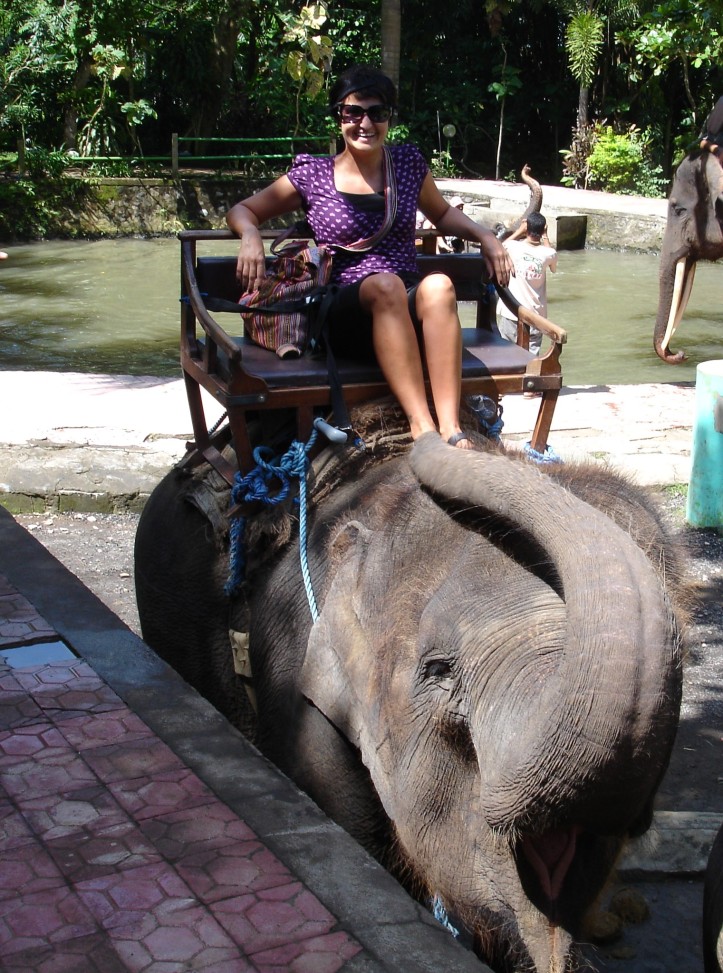
Everyone wants to ride an elephant when they travel to Asia. Including me. Unfortunately it was only afterwards that I learned the disturbing truth about this popular activity. All I thought about was how incredible it would be to sit atop a massive 9 foot tall, 4 ton beast while lumbering through the rivers and jungle of Bali. I couldn’t wait to get a photo of me riding on top of a massive elephant!
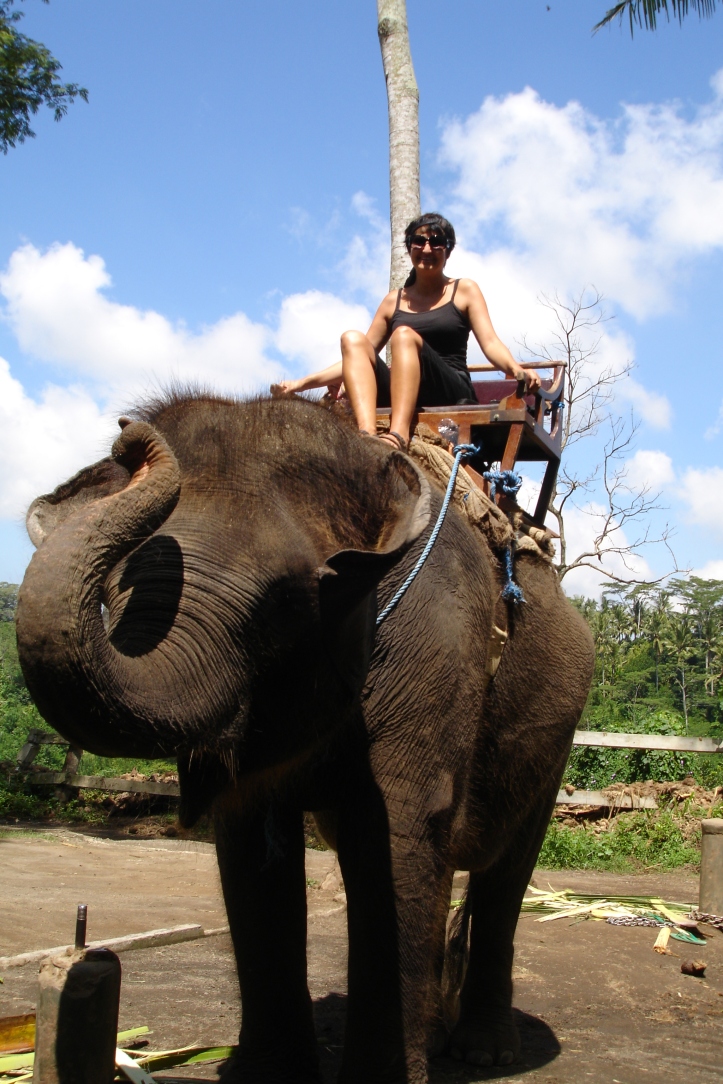
I did some research on the elephant park just outside of Ubud in Bali and it mentioned that the animals had been rescued from areas in Sumatra where many elephants were forced to work in harsh conditions. In my naiveté, I was convinced that they had it much better toting around tourists all day in Bali. So, without a second thought, I booked a tour to experience the elephants.
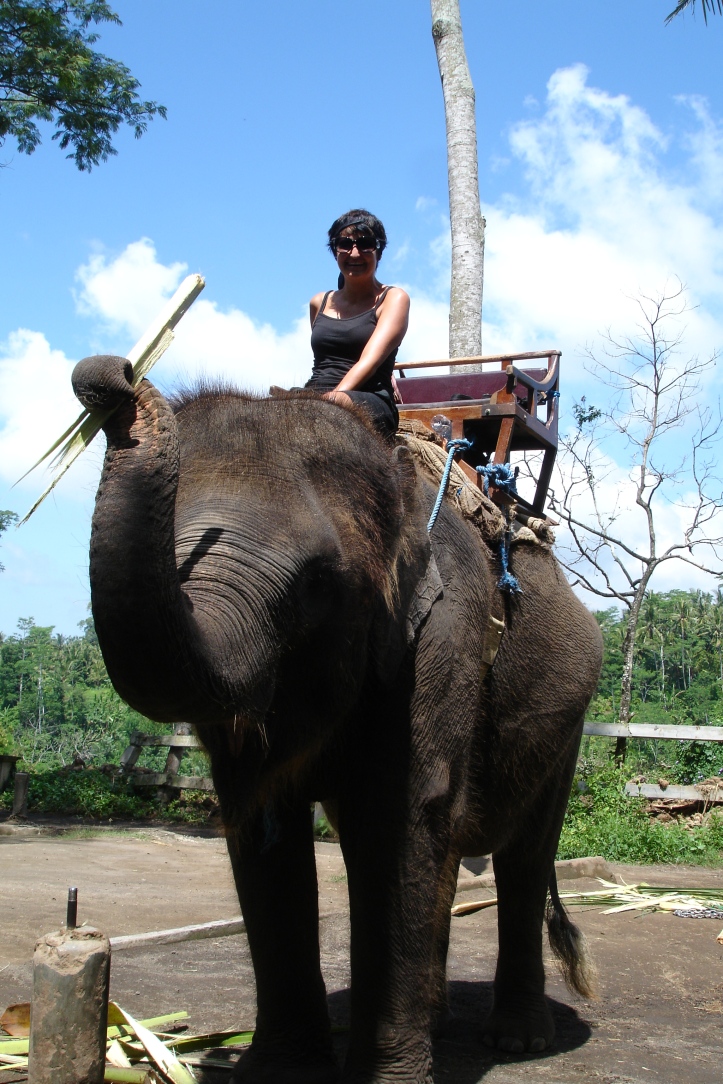
Once there, I was appointed the baby elephant to ride on. Even though it was a baby, it was huge once I got to stand next to it. I climbed onto a large chair like saddle that was strapped around the elephant’s belly and joined the line of elephants already carrying their squealing tourists. I handed my camera to the guide who then took photos of me on this little fellow as we walked through the dense jungle.
An elephant’s gait is not smooth and the entire ride felt like I was slowly being shaken up. The ride was uncomfortable, to say the least, and I was left wondering if there was any reason to ride an elephant other than just to say you had. Which really isn’t a good reason to do much of anything.
However there’s a dark side to elephant tourism that I was not aware of.
These animals had to be extensively trained to become docile ride givers and performers. I don’t know about the training methods used at the park I visited, but the training is often peppered with horrific abuse. While elephants are able to carry a significant amount of weight, the total load of the saddle, guide, and two or more passengers can easily overburden the beautiful animal. The weight, combined with the hours they are forced to cart people around, is often detrimental to the elephant’s physical and mental well being.
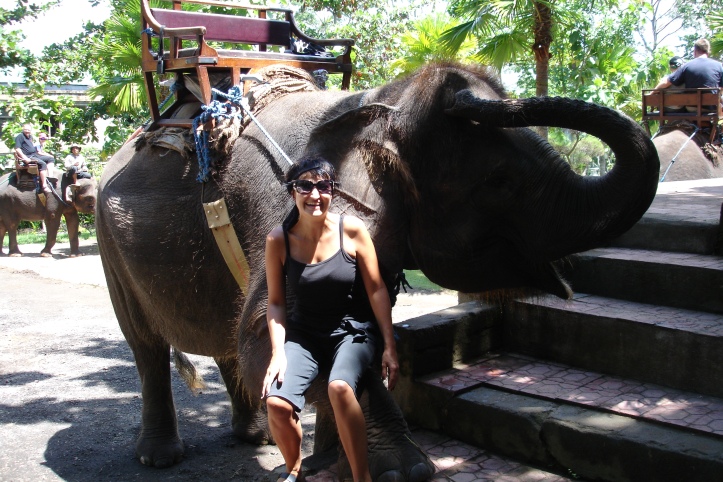
Have you ever done anything while travelling that you regretted later on?

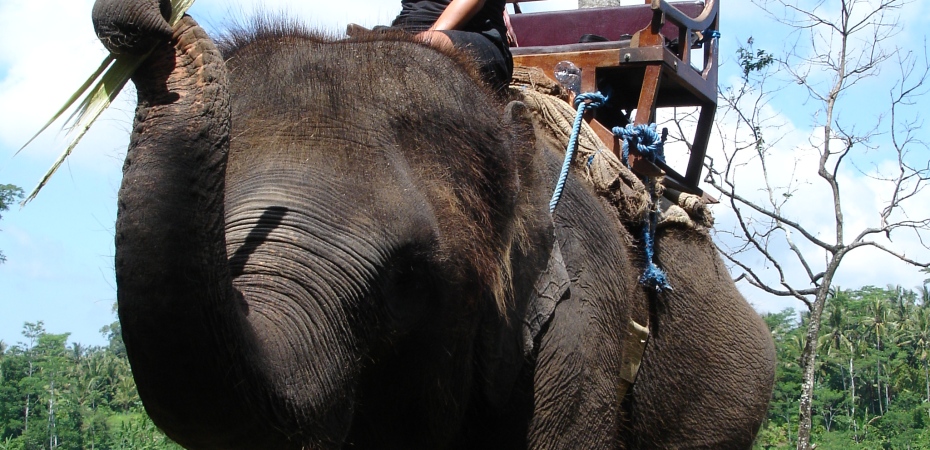




I support The League Against Cruel Sports – they work internationally to improve conditions for all species. They are amazing!
LikeLike
That is sad. My daughter rode an elephant in Bali. She loved the experience. I’m sure she was in the dark as you were.
LikeLiked by 2 people
I do hope that not all places mistreat their animals and hopefully she was at onew of the good sanctuaries.
LikeLiked by 1 person
I so wish there were more humane elephant sanctuaries that allow a positive human interaction! When it comes down to it, wild elephants are meant to be wild. I just returned from a trip to Indonesia and did not ride elephants there. Perhaps somewhere else, after doing my research, one day.
LikeLiked by 2 people
I agree, wild animals should be allowed to be out in the wild and not kept in cages for our entertainment.
LikeLike
I think it’s great that you have been honest in your post experience assessment Janaline. I’m lucky enough to be able to report that apart from donkey rides at Aberdeen Zoo when I was 7 I haven’t ridden any put-upon beasts. I certainly wouldn’t now and I’m pleased that you have blogged about this. 🙂
I have abused a number of mechanical conveyances in my time, for which (as an engineer) I do feel guilty! 😉
LikeLiked by 2 people
Thank you! I know that not all places are cruel to these animals and that some actually help them and save them from places much worse. But I dont think I will be riding any elephants again.
LikeLiked by 1 person
[…] via Would you ride an elephant in Bali? — Janaline’s world journey […]
LikeLiked by 2 people
Thank you so much for the re-blog!
LikeLike
Elephant interaction is one thing, but training them to perform tricks for our amusement is another. I do hope governments start noticing these issues within the tourism and environmental sectors and start addressing them properly. These practices will soon start doing more harm to the economy than good, and the impact on wildlife conservation fronts is a given.
LikeLiked by 2 people
I definitely share you point of view Ysobel and hope that things will change before these creatures are on the endangered list.
LikeLiked by 1 person
I’d love to ride a rescued elephant! They are amazing creatures & I’ve been signing petitions for 2 years to get governments to stand behind their own conservation rules and punish poachers!
LikeLiked by 2 people
The poaching is such an extremely important thing to stand against….it is so cruel and unnecassary. It breaks my heart everytime I hear they have found another elephant or rhino shot or hacked up for their tusks or horns.
LikeLike
This is an excellent post Janaline and couldn’t be more important now as the effort to support sustainable responsible travel is growing. I’m a part of a Travel+Social Good blogging network and if you are interested at all in letting me share this post with our network either on Facebook or as a guest post on my blog let me know. It is so important to get the message out there! Great post!
LikeLiked by 2 people
Thank you so much!! I would love to share this article with other people as I do believe that we as tourists and travellers definitely need to make an effort to help sustain the environment.
LikeLiked by 1 person
Yes, we rode an elephant in India, mostly, like you said, to say we did it! It was the most uncomfortable ride! I would ride a camel any day, instead of an elephant! We did that near Jaisalmer! I love your posts
LikeLiked by 2 people
Thank you so much! Riding on a camel was way more scary and uncomfortable for me that the elephant ride….
LikeLike
Interesting! tc
LikeLike
Really glad you realized this, Janaline! I am planning on visiting the Elephant Nature Park in Chiang Mai in the spring. From my understanding, there, they allow the elephants to roam free and allow visitors to help feed, bathe, and play with the elephants. Definitely no riding on them. I was surprised to find out that although elephants are so huge, their backs actually aren’t made to carry weight, so even the weight of a human (which seems like nothing compared to an elephant) can really hurt the elephant’s back.
LikeLiked by 3 people
Oh wow, I never knew that. I am so glad there are places out there that really take care of the animals and would also love to be able to participate.
LikeLike
Very good and insightful post about elephants. I appreciate that you realised this. I was kind of the same a few years ago until I realised that thank god I had never been to parks with animals like that before because the reality is shocking and sad.
LikeLiked by 2 people
Unfortunately these parks stay open as they make a lot of money from tourists. I dont think people realise how cruelly these animals are treated, otherwise I am sure they wouldnt go to these places.
LikeLike
You look good on top of that elephant 🙂
LikeLiked by 2 people
Thank you Colline…although I do feel a bit guilty it was still a wonderful experience!
LikeLike
Very well written, agree… 🙂
LikeLiked by 3 people
Thank you so much!
LikeLiked by 1 person
I really appreciate the way you have done your research on different aspects of this popular tourist activity and it’s implications, Janaline…
I am from a place where elephants are part of our social and religious structure, but, now a days capturing the elephants and training them has almost stopped…
But, one thing I always regretted as a tourist is the amount of plastic waste that we had to leave behind, with no options for proper waste segregation or management available.
I try to carry almost everything back to the city rather than leaving it behind at ecologically sensitive areas 🙂
Thank you for sharing the thought provoking post and have a nice day 🙂
LikeLiked by 5 people
You’re a thoughtful tourist, many could learn from your good practice. We have locals who can’t even bother taking their rubbish with them. They throw it out the car window or leave it behind in the car park 😡
LikeLiked by 2 people
Thank you so much for your kind words 🙂
LikeLiked by 1 person
I agree with your both….local people need to be taught to look after their environment and tourists should always try and make as little impact on the natural environment as possible.
LikeLiked by 1 person
I love elephants and always wanted to experience riding atop one however I’ve changed my mind after reading several articles about how they’re ‘trained’. Like tiger experiences and other interactions with wildlife, it doesn’t hold much appeal for me unless the organisation is truly concerned with animal welfare and the conservation of a species. That said, I’ve enjoyed visiting Taronga Zoo and Seaworld in Australia and see the amazing creatures that they look after and although I would much prefer to see these creatures in their natural environment these two organisations do contribute to conservation of a variety of species as well as rescue.
LikeLiked by 4 people
I also support any organization that really looks after and is concerned for the wellbeing of animals. I have seen some great places like the Eagle and wild bird rehab here in South Africa and some very cruel places that break your heart. I try and support the good ones and see how they help the animals.
LikeLiked by 1 person